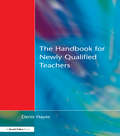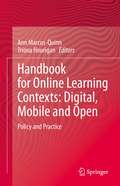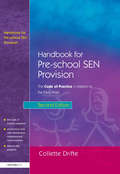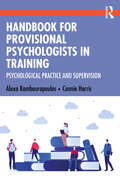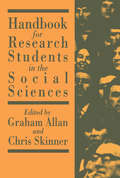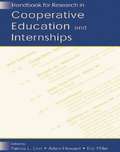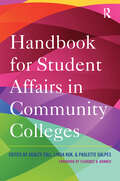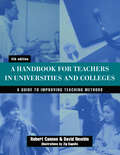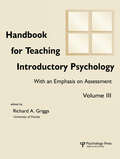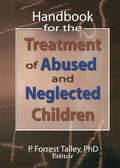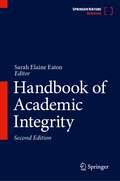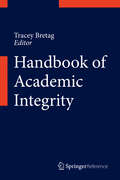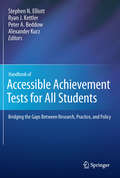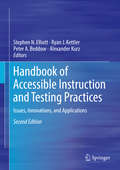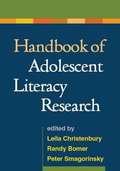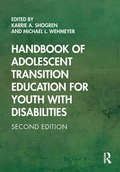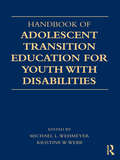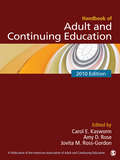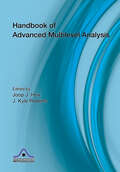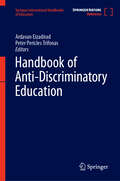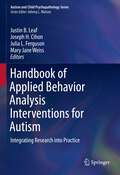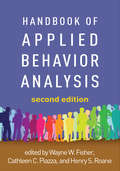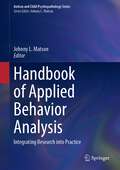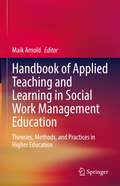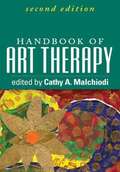- Table View
- List View
Handbook for Newly Qualified Teachers: Meeting the Standards in Primary and Middle Schools
by Denis HayesFirst Published in 2000. Routledge is an imprint of Taylor & Francis, an informa company.
Handbook for Online Learning Contexts: Policy and Practice
by Ann Marcus-Quinn Tríona HouriganThis book addresses the gap in the literature concerned with global case studies of successful Digital, Mobile and Open Education. The book shares experiences from international teaching and learning projects at all levels of Education, and provides advice for future policy and investment in digital teaching and learning and Open Education projects. It also provides an expectation on the future capacity and sustainability of Open Education.
Handbook for Pre-School SEN Provision: The Code of Practice in Relation to the Early Years
by Chris Spencer Kate SchnellingDesigned specifically for those involved in pre-school education, including nursery teachers, learning support assistants and helpers in a range of provisions, this handbook has been updated to enable carers to comply with the latest requirements of the Code of Practice and to prepare for an OFSTED inspection. It will assist in the identification and assessment of young children with special educational needs. The book provides a ready-made system for record keeping at each stage of assessment and provides a comprehensive system for monitoring and evaluation.
Handbook for Provisional Psychologists in Training: Psychological Practice and Supervision
by Alexa Kambouropoulos Connie HarrisThis book provides provisional psychologists in training with a comprehensive and practical understanding of the specific skills and competencies required in the profession, during placement and beyond, in varied settings. Handbook for Provisional Psychologists in Training supports the personal and professional development of provisional psychologists undertaking the Master of Professional Psychology and brings together current research findings with practical insights and resources. It covers all aspects of practice for trainees, such as establishing professional relationships and maintaining professional boundaries, applying evidence-based theory to practice, utilisation of psychological treatments, communicating with clients about treatment, making referrals and self-reflective practice. It also enables provisional psychologists to prepare for psychological practice in varied settings, including working with children, adults, and diverse populations. This book will be helpful to all provisional psychologists but particularly those undertaking the Master of Professional Psychology 5+1 pathway.
Handbook for Research Students in the Social Sciences
by Graham Allan Chris SkinnerThis book discusses how to undertake a research degree, study and research skills and strategic approaches to research. It is intended to help research students, working full- or part-time in the social sciences, to be as effective as possible in the pursuit of their degrees.
Handbook for Research in Cooperative Education and Internships
by Eric Miller Adam Howard Patricia L. LinnThis Handbook is designed to help cooperative education and internship professionals and employers design, carry out, and disseminate quality research and evaluation studies of work-based education. It offers examples of current, leading-edge studies about work-based education, but with a practical twist: The chapter authors frame their studies within a specific key research design issue, including finding a starting point and a theoretical framework; fitting research into one's busy practitioner workload; deciding on particular data-gathering methods and an overall methodological approach; integrating qualitative and quantitative methodologies; and disseminating results. Also addressed are questions and concerns that are relevant throughout the course of a research project: the use of theory in research; the role and relationship of program assessment to research; and ethical considerations in research. By combining descriptions of exemplary research and evaluation studies with practical advice from top researchers in the field, this volume is a useful tool for educators and employers who are designing and carrying out their own studies, as well as a resource for what current research is discovering and affirming about the field itself. Educators from other fields, such as study abroad and service-learning will also find this book an indispensable reference in conducting research on experiential learning and teaching.
Handbook for Student Affairs in Community Colleges
by Paulette Dalpes Ashley Tull Linda KukIn addressing the unique issues related to the delivery of student services in the community college setting, this book fills a longstanding need to provide practitioners with a contextual framework for their work. Starting by providing the historical context to the development of student affairs in community colleges, this handbook describes the organization of key functions and current practice, and looks at the specific constraints, opportunities, changes and future challenges that practitioners face.Community colleges are grappling with: the realities of shrinking resources; an increasingly diverse and disparate student body, with many attending part-time; demands for greater accountability; a generational change in leadership; and pressures to expand their missions as well as adopt educational technology – all of which have an impact on the role of student affairs.Among the topics covered are: Partnering with Academic Affairs; Financing Student Affairs; Legal and Policy Issues; Strategic Planning and Assessment; Accreditation and Accountability; Technology for Communication and Engagement; Academic Support Services; Student Life and Student Engagement Programs and Services; Enrollment Management; and Services for Special Populations.This handbook is intended for student affairs administrators and professionals at all stages of their careers, as well as for students in graduate preparation programs.
Handbook for Teachers in Universities and Colleges
by Robert Cannon David NewbleFirst Published in 2000. Routledge is an imprint of Taylor & Francis, an informa company.
Handbook for Teaching Introductory Psychology: Volume Ii
by Ludy T. Benjamin Michelle Rae Hebl Charles L. BrewerLike its predecessors, Volume III of the Handbook for Teaching Introductory Psychology provides introductory psychology instructors with teaching ideas and activities that can immediately be put into practice in the classroom. It contains an organized collection of articles from Teaching of Psychology (TOP), the official journal of the Society for the Teaching of Psychology, Division 2 of the American Psychological Association. Volume III contains 89 articles from TOP that have not been included in other volumes. Another distinction between this volume and its predecessors is its emphasis on testing and assessment. The book is divided into two sections. Section One, "Issues and Approaches in Teaching Introductory Psychology," contains 52 articles on critical issues, such as: how to approach the course; understanding students' interests, perceptions, and motives; students' existing knowledge of psychology (including their misconceptions); a comparison of introductory textbooks and tips on how to evaluate them; test questions and student factors affecting exam performance; an overview of different forms of feedback; giving extra credit; and how to deal with academic dishonesty. Section Two consists of 37 articles that present demonstrations, class and laboratory projects, and other techniques to enhance teaching and learning in both the introductory, as well as advanced courses in the discipline. This section is organized so as to parallel the order of topics found in most introductory psychology textbooks. Intended for academicians who teach the introductory psychology course and/or oversee grad assistants who teach the course, all royalties of the book go directly to the Society for the Teaching of Psychology to promote its activities to further improve the teaching of psychology.
Handbook for the Treatment of Abused and Neglected Children (Haworth Social Work Practice With Children And Families Ser.)
by P. Forrest TalleyPractical solutions for difficult clinical situations!With many chapters written by some of the field's best known contributors, this handbook was developed for the practitioner who wants practical and effective guidance for helping abused children. Each major area of clinical practice is discussed by experienced professionals, providing you with new insights and ideas regarding: medical findings; clinical assessment; individual, group, and family therapy; testifying in court; the role of medication in treatment, and much more. To make the application from the written page to your practice even more compelling, every clinical chapter is followed by a patient vignette that demonstrates how the principles just described can be successfully applied in the working world of therapists. Whether abused children number only a few or many on your caseload, this is a handbook to which you will often refer over the years. The Handbook for the Treatment of Abused and Neglected Children pulls together a wide range of practical information for therapists on how to effectively work with abused and neglected children. Unlike other volumes on the subject, this book puts the information in context, with a &’big picture&’ overview of how the therapist fits into the larger system into which the child has been swept up-Child Protective Services, legal proceedings, medical issues, disputes regarding custody, etc. Inside, you&’ll find effective strategies for: conducting individual therapy with abused children-how to begin therapy, identify distortions, effectively challenge ingrained patterns of behavior, and constructively bring therapy to a close navigating the maze of Child Protective Services-knowing what resources are available, what obstacles are likely to arise, and how to work with social workers understanding the medical findings of maltreated children-how information from a child&’s physician can provide critical insights into the child&’s experience, and often into children&’s expectations of future relationships testifying in court as a therapist-how the court works and how to prepare to give effective testimony facilitating parent interventions-how to help mothers and fathers develop relationships with their children to the fullest and nurture each child&’s potential as his or her personality developsThe Handbook for the Treatment of Abused and Neglected Children will prove valuable for students and educators as well as novice and experienced therapists. Whether you see children only occasionally or focus your practice on maltreated children, this one-of-a-kind resource deserves a place in your professional collection.
Handbook of Academic Integrity
by Sarah Elaine EatonThe book brings together diverse views from around the world and provides a comprehensive overview of academic integrity and how to create the ethical academy. At the same time, the Handbook does not shy away from some of the vigorous debates in the field such as the causes of academic integrity breaches. There has been an explosion of interest in academic integrity in the last 20-30 years. New technologies that have made it easier than ever for students to ‘cut and paste’, coupled with global media scandals of high profile researchers behaving badly, have resulted in the perception that plagiarism is ‘on the rise’. This, in combination with the massification and commercialisation of higher education, has resulted in a burgeoning interest in the importance of academic integrity, how to safeguard it and how to address breaches appropriately. What may have seemed like a relatively easy topic to address – students copying sources without attribution – has in fact, turned out to be a complex, interdisciplinary field of research requiring contributions from linguists, psychologists, social scientists, anthropologists, teaching and learning specialists, mathematicians, accountants, medical doctors, lawyers and philosophers, to name just a few.Because of this broad interest and input, this handbook serves as the single authoritative reference work which brings together the vast, growing, interdisciplinary and at times contradictory body of literature. For both established researchers/practitioners and those new to the field, this Handbook provides a one-stop-shop as well as a launching pad for new explorations and discussions.
Handbook of Academic Integrity
by Tracey BretagThe book brings together diverse views from around the world and provides a comprehensive overview of the subject, beginning with different definitions of academic integrity through how to create the ethical academy. At the same time, the Handbook does not shy away from some of the vigorous debates in the field such as the causes of academic integrity breaches. There has been an explosion of interest in academic integrity in the last 10-20 years. New technologies that have made it easier than ever for students to 'cut and paste', coupled with global media scandals of high profile researchers behaving badly, have resulted in the perception that plagiarism is 'on the rise'. This, in combination with the massification and commercialisation of higher education, has resulted in a burgeoning interest in the importance of academic integrity, how to safeguard it and how to address breaches appropriately. What may have seemed like a relatively easy topic to address - students copying sources without attribution - has in fact, turned out to be a very complex, interdisciplinary field of research requiring contributions from linguists, psychologists, social scientists, anthropologists, teaching and learning specialists, mathematicians, accountants, medical doctors, lawyers and philosophers, to name just a few. Despite or perhaps because of this broad interest and input, there has been no single authoritative reference work which brings together the vast, growing, interdisciplinary and at times contradictory body of literature. For both established researchers/practitioners and those new to the field, this Handbook provides a one-stop-shop as well as a launching pad for new explorations and discussions.
Handbook of Accessible Achievement Tests for All Students
by Ryan J. Kettler Alexander Kurz Peter A. Beddow Stephen N. ElliottThe Handbook of Accessible Achievement Tests for All Students: Bridging the Gaps Between Research, Practice, and Policy presents a wealth of evidence-based solutions designed to move the assessment field beyond "universal" standards and policies toward practices that enhance learning and testing outcomes. Drawing on an extensive research and theoretical base as well as emerging areas of interest, the volume focuses on major policy concerns, instructional considerations, and test design issues, including: The IEP team's role in sound assessment.The relationships among opportunity to learn, assessment, and learning outcomes.Innovations in computerized testing and the "6D" framework for standard setting.Legal issues in the assessment of special populations.Guidelines for linguistically accessible assessments.Evidence-based methods for making item modifications that increase the validity of inferences from test scores.Strategies for writing clearer test items.Methods for including student input in assessment design.Suggestions for better measurement and tests that are more inclusive.This Handbook is an essential reference for researchers, practitioners, and graduate students in education and allied disciplines, including child and school psychology, social work, special education, learning and measurement, and education policy.
Handbook of Accessible Instruction and Testing Practices: Issues, Innovations, And Applications
by Ryan J. Kettler Alexander Kurz Peter A. Beddow Stephen N. ElliottThe Second Edition of this handbook provides comprehensive coverage of the concept of accessibility and its application to the design and implementation of instruction and tests with all students. It updates and expands on its original contents and responds to the increasing demand for research-based evidence of accessible instruction and testing practices from the professional community. Chapters explore how outcomes are affected when essential features or components of instructional materials and tests are not accessible to any portion of the student population. The handbook addresses the new set of Standards for Educational and Psychological Testing that was published in 2014 as well as requirements for a high level of access for all interim and summative tests by national testing consortiums. In addition, the handbook describes how the Center for Applied Special Technology (CAST) has continued to advance Universal Design for Learning (UDL) principles in mainstream education with teachers of all types of students, not just students with disabilities.Topics featured in this text include: A summary of U.S. policies that support inclusive assessment for students with disabilities. An overview of international policies that support inclusive assessments. Designing, developing, and implementing an accessible computer-based national assessment system. Universal Design for Learning (UDL) principles and the future of assessment. Recent advancements in the accessibility of digitally delivered educational assessments. The Handbook of Accessible Instruction and Testing Practices, Second Edition is an essential reference for researchers, practitioners, and graduate students in education and allied disciplines, including child and school psychology; assessment, testing and evaluation; social work; and education policy and politics.
Handbook of Adolescent Literacy Research
by Leila Christenbury Randy BomerThe first comprehensive research handbook of its kind, this volume showcases innovative approaches to understanding adolescent literacy learning in a variety of settings. Distinguished contributors examine how well adolescents are served by current instructional practices and highlight ways to translate research findings more effectively into sound teaching and policymaking. The book explores social and cultural factors in adolescents' approach to communication and response to instruction, and sections address literacy both in and out of schools, including literacy expectations in the contemporary workplace. Detailed attention is given to issues of diversity and individual differences among learners.
Handbook of Adolescent Transition Education for Youth with Disabilities
by Michael L. Wehmeyer Karrie A. ShogrenNow in a thoroughly revised and updated second edition, this handbook provides a comprehensive resource for those who facilitate the complex transitions to adulthood for adolescents with disabilities. Building on the previous edition, the text includes recent advances in the field of adolescent transition education, with a focus on innovation in assessment, intervention, and supports for the effective transition from school to adult life. The second edition reflects the changing nature of the demands of transition education and adopts a "life design" approach. This critical resource is appropriate for researchers and graduate-level instructors in special and vocational education, in-service administrators and policy makers, and transition service providers.
Handbook of Adolescent Transition Education for Youth with Disabilities
by Michael L. Wehmeyer Kristine W. WebbTransition from secondary education to adulthood represents a period during which adolescents with disabilities face multiple responsibilities and changing roles that include establishing independence, attending postsecondary education or training, developing social networks, choosing a career, participating in their communities, and managing healthcare and financial affairs. Sponsored by the Division of Career Development and Transition (DCDT) of the Council of Exceptional Children, this handbook provides a comprehensive resource to the communities of educators, related service and agency personnel, families, caretakers, counselors, and other stakeholders who facilitate these complex transitions to adulthood for adolescents with disabilities. Comprehensive – This comprehensive volume includes coverage of historical foundations, policy, transition programming and planning, development of student skills, and program structure. It also recommends transition supports for students with specific disabilities. Organizing Taxonomy – The book is organized around a well recognized taxonomy for adolescent transition used by many states to design and reform their transition services. Expertise – The volume editors are past-presidents of the Council for Exceptional Children’s Division on Career Development and are leaders in transition research and practice. Contributors are well-recognized for their expertise in transition. Chapter Structure – Each chapter includes a discussion of evidence-based research, recommended practices, suggestions for transition personnel and families, and additional resources. This book is appropriate for researchers and graduate-level instructors in special education and vocational education, inservice administrators and policy makers, and transition service providers.
Handbook of Adult and Continuing Education
by Amy D. Rose Carol E. Kasworm Jovita M. Ross-GordonAn authoritative overview of the current state of the field of adult and continuing education Drawing on the contributions of 75 leading authors in the field, this 2010 Edition of the respected Handbook of Adult and Continuing Education provides adult education scholars, program administrators, and teachers with a solid foundation for understanding the current guiding beliefs, practices, and tensions faced in the field, as well as a basis for developing and refining their own approaches to their work and scholarship. Offering expanded discussions in the areas of social justice, technology, and the global dimensions of adult and continuing education, the Handbook continues the tradition of previous volumes with discussions of contemporary theories, current forms and contexts of practice, and core processes and functions. Insightful chapters examine adult and continuing education as it relates to gender and sexuality, race, our aging society, class and place, and disability. Key FeaturesExpanded coverage of social justice, the impact of technology, and the global dimensions of adult and continuing education provides a useful update on theories and practices in the field as they have evolved during the last decade.An invaluable introductory overview and synthesis of key aspects of the field of practice and scholarship acquaints new readers to the fieldThe centrality of social justice in adult and continuing education is addressed in a new section.The broader global context of contemporary adult and continuing education is covered in a final section.
Handbook of Advanced Multilevel Analysis (European Association of Methodology Series)
by Joop J. HoxThis new handbook is the definitive resource on advanced topics related to multilevel analysis. The editors assembled the top minds in the field to address the latest applications of multilevel modeling as well as the specific difficulties and methodological problems that are becoming more common as more complicated models are developed. Each chapter features examples that use actual datasets. These datasets, as well as the code to run the models, are available on the book’s website http://www.hlm-online.com . Each chapter includes an introduction that sets the stage for the material to come and a conclusion. Divided into five sections, the first provides a broad introduction to the field that serves as a framework for understanding the latter chapters. Part 2 focuses on multilevel latent variable modeling including item response theory and mixture modeling. Section 3 addresses models used for longitudinal data including growth curve and structural equation modeling. Special estimation problems are examined in section 4 including the difficulties involved in estimating survival analysis, Bayesian estimation, bootstrapping, multiple imputation, and complicated models, including generalized linear models, optimal design in multilevel models, and more. The book’s concluding section focuses on statistical design issues encountered when doing multilevel modeling including nested designs, analyzing cross-classified models, and dyadic data analysis. Intended for methodologists, statisticians, and researchers in a variety of fields including psychology, education, and the social and health sciences, this handbook also serves as an excellent text for graduate and PhD level courses in multilevel modeling. A basic knowledge of multilevel modeling is assumed.
Handbook of Anti-Discriminatory Education (Springer International Handbooks of Education)
by Peter Pericles Trifonas Ardavan EizadiradThis comprehensive handbook addresses issues related to anti-discriminatory education as it relates to children, youth, young adults, families, and practitioners across a series of age groups, sectors, communities, and countries. It seeks to map a holistic interdisciplinary overview of the field examining how policies, practices, and initiatives within unique social, political, and cultural contexts have been enacted to advance anti-discriminatory education for improved equity, diversity, and inclusion outcomes leading to thriving school-community ecosystems. The work draws on a range of theoretical frameworks, hybrid perspectives, and research projects to provide multiple examples about the challenges, complexities, and nuances involved in theorizing and doing the work of anti-discriminatory education in local communities and on a macro institutional level. With intentionality, authors from various backgrounds, identities, fields, and positionalities describe and discuss various social justice and equity issues and how they strategize, mobilize, and navigate unique micro and macro dynamics affiliated with power and privilege for the purpose of advancing the field of anti-discriminatory education. Overall, the chapters cover a range of topics and issues from various practitioners and community perspectives around the intersectionality and divergence of navigating micro lived experiences and macro institutional policies and practices to bridge the gap between theory and action with respect to anti-discriminatory education. The book is divided into 4 sub-sections: Early Childhood Education (Early years up to approx. 10 years old), Elementary and Middle School Years (approx. 11 to 14 years old), Secondary Schools (approx. 15 to 19 years old), and Higher Education (Post-Secondary).
Handbook of Applied Behavior Analysis Interventions for Autism: Integrating Research into Practice (Autism and Child Psychopathology Series)
by Justin B. Leaf Mary Jane Weiss Joseph H. Cihon Julia L. FergusonThis handbook addresses evidence-based practices in Applied Behavior Analysis (ABA) for individuals diagnosed with autism spectrum disorder (ASD). It provides an overview of the history of evidence-based practices and their importance as applied to the law, school settings, and factors that influence the use for treatment of ASD. Additional areas of coverage include evidence-based and non-evidence-based ABA interventions for autism as well as decision-making ethics related to these treatments. In addition, the book addresses cultural considerations as they relate to these treatments and examines procedural aspects of ABA interventions for autism. Key ABA treatments addressed include: Discrete trial teaching. Pivotal response training. Video modeling. Parent-mediated intervention. Early Start Denver Model, PEAK, PECS, and AAC. Script fading/activity schedules and differential reinforcement/extinction. Response interruption and redirection. Self-management and self-monitoring. The Handbook of Applied Behavior Analysis Interventions for Autism is a must-have resource for researchers, professors, and graduate students as well as clinicians, therapists, and other professionals across such interrelated disciplines as clinical child, school, and developmental psychology, child and adolescent psychiatry, social work, rehabilitation medicine/therapy, pediatrics, and special education.
Handbook of Applied Behavior Analysis, Second Edition
by Wayne W. Fisher, Cathleen C. Piazza and Henry S. RoaneWidely regarded as the authoritative work on the principles and practice of applied behavior analysis (ABA), this indispensable volume is now in a revised and expanded second edition. Leading experts present evidence-based procedures for supporting positive behaviors and reducing problem behaviors with children and adults in diverse contexts. Chapters delve into applications in education, autism treatment, addictions, behavioral pediatrics, and other areas. Covering everything from behavioral assessment and measurement to the design and implementation of individualized interventions, the Handbook is a complete reference and training tool for ABA practitioners and students. New to This Edition *Incorporates key advances in research, theory, and clinical practice. *Chapters on additional applications: school consultation, pediatric feeding disorders, and telehealth services. *Chapters on quantitative analysis of behavior (matching and behavioral momentum theory) and behavioral economics. *Updated discussions of professional issues, ABA certification, and technology tools.
Handbook of Applied Behavior Analysis: Integrating Research into Practice (Autism and Child Psychopathology Series)
by Johnny L. MatsonThis book provides comprehensive coverage of applied behavioral analysis (ABA). It examines the history and training methods of ABA as well as related ethical and legal issues. The book discusses various aspects of reinforcement, including social reinforcers, tangible reinforcers, automatic reinforcement, thinning reinforcers, and behavioral momentum. It addresses basic training strategies, such as prompts and fadings, stimulus fading, and stimulus pairing and provides insights into auditory/visual discrimination, instructional feedback, generalization, error correction procedures, and response interruption. In addition, the book addresses the use of ABA in education and explores compliance training, on-task behavior, teaching play and social skills, listening and academic skills, technology, remembering and cognitions, picture-based instruction, foreign language instruction, teaching verbal behavior, public speaking, and vocational skills. In addition, the book covers treatments for tics, trichotillomania, stereotypies, self-injurious behavior, aggression, and toe walking. It also addresses ABA for special populations, including individuals with autism, ADHD, substance abuse, and intellectual disabilities.Featured areas of coverage include:Basic assessment methods, such as observing behavior, treatment integrity, social validation, evaluating physical activity, measuring sleep disturbances, preference assessment, and establishing criteria for skill mastery.Functional assessment, including how to quantify outcomes and evaluate results, behaviors that precede and are linked to target behaviors, and treatments.Treatment methods, such as token economies, discrete trial instruction, protective equipment, group-based and parent training as well as staff training and self-control procedures.Health issues, including dental and self-care, life skills, mealtime and feeding, telehealth, smoking reduction and cessation, and safety training.Leisure and social skills, such as cellphone use, gambling, teaching music, sports and physical fitness.The Handbook of Applied Behavior Analysis is a must-have reference for researchers, professors, and graduate students as well as clinicians, therapists, and other professionals in clinical child and school psychology, child and adolescent psychiatry, social work, behavioral therapy and rehabilitation, special education, developmental psychology, pediatrics, nursing, and all interrelated disciplines.
Handbook of Applied Teaching and Learning in Social Work Management Education: Theories, Methods, and Practices in Higher Education
by Maik ArnoldThis up-to-date reference work explores theories, methods and practices of social work management education in higher education. It includes contributions from more than 30 scholars and researchers in the field of social work management education from more than 10 countries and 4 continents.The work is unique as it overcomes current barriers between the different sub-disciplines of social work didactics and management education, and takes into consideration the development of a discipline-specific Scholarship of Teaching and Learning (SoTL). The integrated and transdisciplinary approach to social work management education presented in this edited volume is of paramount importance to international scholars, teachers, practitioners, students and all other audiences interested in the field of education. The work provides an overview of the theoretical principles on how social work management can be taught and learned, and analyzes curricula, pedagogical approaches, actors, and socio-economic and institutional contexts of social work management at higher education institutions
Handbook of Art Therapy, Second Edition
by Cathy A. MalchiodiWidely regarded as the standard reference in the field, this handbook provides a complete overview of art therapy, from theory and research to practical applications. Leading practitioners demonstrate the nuts and bolts of arts-based intervention with children, adults, families, couples, and groups dealing with a wide range of clinical issues. Rich with illustrative case material, the volume features 110 sample drawings and other artwork. The inclusion of diverse theoretical approaches and practice settings makes the Handbook eminently useful for all mental health professionals interested in using art in evaluation and treatment. New to This Edition Incorporates the latest clinical applications, methods, and research. Chapter on art materials and media (including uses of new technologies). Chapters on intervening with domestic violence survivors, bereaved children, and military personnel. Expanded coverage of neuroscience, cultural diversity, and ethics.
